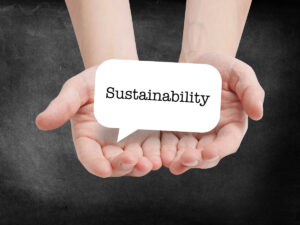In a special on-line report, The Economist looks into its crystal ball and writes about the year ahead [The World in 2009]. One of the lead articles deals with the topic of sustainability [“The year of unsustainability“, Daniel Franklin, editor]. As the title of the article indicates, the magazine is not very optimistic. It begins its assessment by noting that there exists a certain ambiguity associated with the term “sustainability.”
“For business, the buzzword of 2008 was ‘sustainability’. Never properly defined, it meant different things to different people, which of course added to its charm. In part it was a new way of packaging the clumsy old ‘corporate social responsibility’ (CSR). And it added a virtuous green dimension: sustainable business would help to save the planet. So companies appointed chief sustainability officers and printed (or, to avoid felling more rainforest, electronically distributed) sustainability reports full of photographs of green fields and blossom. But that was then.”
The magazine sees corporate social responsibility as humanity’s fairweather friend. When times get tough, the hearts of businesses’ harden. Ironically, the article notes, “sustainability” may soon be equated to resilience or even survival.
“In 2009 sustainability will take on a new meaning in boardrooms: staying in business. As recession bites and growth slows, bankruptcies will soar. To sustain profits, companies will slash costs and cut jobs, while consumers will be even less prepared to pay extra for organic food or air-travel offsets.”
The magazine’s prediction is that past commitments to social responsibility and environmentally friendly practices will turn out to be little more than rhetoric — and it argues there is nothing wrong with that.
“The budgets for worthy projects in the developing world, let alone for supporting opera houses, will be trimmed or cut altogether as their champions find the spending impossible to defend amid the lay-offs. Even the easy wins in the sustainability business—saving both money and the planet by cutting energy usage—will be less rewarding with lower oil prices. Some of this will be salutary. In the face of the fashion for CSR, companies have tended to make two mistakes. First, they have been too defensive about the benefits they bring to society by the simple fact of being in business. They provide employment, as well as the goods and services that their customers want—and the threat of job losses and even bankruptcies will serve as a powerful reminder of this basic reality. Second, many companies pretend that their sustainability strategy runs deeper than it really does. It has become almost obligatory for executives to claim that CSR is ‘connected to the core’ of corporate strategy, or that it has become ‘part of the DNA’. In truth, even ardent advocates of sustainability struggle to identify more than a handful of examples. More often the activities that go under the sustainability banner are a hotch-potch of pet projects at best tenuously related to the core business. The coming shake-out will help to remove some of this froth.”
It’s difficult to argue with the article’s reasoning. Rich companies, like rich men, can afford to be charitable. Philanthropy is much more difficult in hard times. It’s also true that businesses don’t take enough credit for providing a public good in the form of employment, taxes, and products (when those products are produced ethically and adhere to high standards of quality). But, as the article goes on to note, being good corporate citizens doesn’t necessarily rely on making huge donations to pet projects.
“It would be wrong for companies to conclude that they can forget about trying to be good. The forces that have pushed companies to fret about sustainability—the scrutiny from the internet, multiplying lobby groups, popular concern about global warming, the threat of lawsuits for misbehaviour on human rights—are not about to disappear. Nor will the desire of potential recruits to work for companies with ‘values’ suddenly vanish. In the competition for the best business-school graduates and other high-flyers, especially once the economy starts to recover, companies that show that they were not mere fairweather friends of sustainability will be at an advantage.”
The article doesn’t touch on another area where companies can do good by helping themselves. In emerging market countries, especially those blessed with natural resources, companies that want to extract those resources require healthy and skilled workers. Helping provide healthcare and training benefits both the company and the community at large. Such self-enlightened “sustainability” efforts are win-win activities (see my post Training, Education, and Development). The article continues:
“If companies are not seen to take their social responsibility seriously, governments will intervene to change the rules by which they operate. Some will force companies to sell greener products (for example, by banning the sale of incandescent light bulbs). Others will legislate on executive pay, or oblige banks to lend money in ways the state deems desirable. After rescuing the financial system, many Western governments will imagine that they are the best judges of how to run businesses responsibly.”
Most socialist experiments have not ended well, but neither have attempts at deregulation. The larger challenge raised by the article is that governments have issues of their own to work out and trying to run failing businesses at the same time may be a bridge too far. Just like businesses, predicts the article, governments will likely try to back off some the commitments they made during flush times.
“In 2009 governments face their own test on ‘sustainability’. A summit in Copenhagen at the end of the year is supposed to hammer out a post-Kyoto agreement to cut greenhouse gases. Already pressure is growing to avoid the growth-inhibiting restrictions needed to meet ambitious carbon-cutting targets. Failure to reach a deal will mean, in effect, that the world gives up seriously seeking to stop global warming. Instead, attention would turn to ways the world might adapt to climate change rather than prevent it. Governments and businesses alike have talked up their commitments to sustainability in recent years. In 2009 both will have to show whether they really meant it.”
As a side note, my colleague Tom Barnett argues in his forthcoming book Great Powers: America and the World After Bush, that adapting to climate change is not such a bad thing.
“There’s the bigger argument offered by [Danish economist Bjørn] Lomborg in his brilliant little 2007 book, Cool It! Like Lomborg, I see no reason to debate whether the world is getting warmer or whether human activity is causing such change. Both points seem reasonably well established by the global scientific community. The real question is whether or not we need to elevate global warming to the status of the greatest crisis of our age. … As Lomborg argues, our ultimate goal shouldn’t be the reduction of greenhouse gases or global warming per se, ‘but to improve the quality of life and the environment’ for future generations. … Why not ask [the] emerging global middle class how the global economy can best meet its needs and expectations for a better life? Why not center globalization’s ideology in that massive middle instead of on the extreme have/have-not margins? … If the West’s fundamental offer to these emerging economies is to curtail their growth potential as a way of avoiding future resource wars, then we will end up doing nothing more than guaranteeing that such conflicts occur. … Human history, as Lomborg points out, says we do better when it gets warmer and that we do worse when it gets colder. It also tells us that it’s far easier (and cheaper) to cool people in hot climes than keep them warm in cold ones.”
The bottom line is not that profits trump social responsibility but that if corporate responsibility is really going to be “part of a company’s DNA” then it must create a win-win situation that benefits both the company and the community at large. First and foremost, as the article points out, that can only be accomplished if a company survives. A well-intentioned company that goes out of business can offer “zero” contributions to society.




